An Interview with Actress Cha Ye-ryun and Producer Lee Choon-yun
by Kyu Hyun Kim
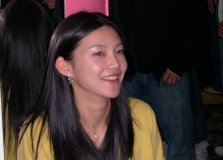
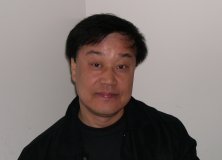
Few fans of Korean cinema will disagree that Whispering Corridors (known in Korean as "Yeogo Gwedam," or "Girls' High School Scary Tales") series has been one of the most successful Korean film franchises in recent memory. Beginning with the runaway hit Whispering Corridors (1998), the series so far also includes: the beautiful and enigmatic Memento Mori (1999), considered by many as one of the best Korean films of the 1990s, the psychologically astute Wishing Stairs (2003) and the thoughtful and bleak Voice (2005). The series has also solidified its reputation as a launching pad for many talented young actresses who either debuted or first received the spotlight by playing terrified (or terrifying) high school students in these films: Kim Kyu-ri, Park Jin-hee, Shin Yi and Yoon Ji-hye in Whispering Corridors; Kong Hyo-jin, Kim Min-sun, Park Ye-jin and Lee Young-jin in Memento Mori; Jo An, Song Ji-hyo and Pak Han-byul in Wishing Stairs; and Kim Ok-bin, Seo Ji-hye and Cha Ye-ryun in Voice.
Thanks to an arrangement made by the Koreans in Media Arts members for the 2006 San Francisco Korean-American Film Festival, I was able to conduct a short interview with Producer Lee Choon-yun, whose rock-solid commitment to the Whispering Corridors series has paid off handsomely over the years both commercially and artistically.
Born in 1951, Producer Lee began his distinguished career as a producer of theater musicals such as Evita and Jesus Christ Superstar in late 1970s. He entered the world of Korean cinema in the 1980s and shepherded such ambitious artistic projects as Agatha (1984) and Jang Sun-woo's Age of Success (1988) as well as star-making hits including Kang Woo-suk's Happiness Does Not Depend on School Records (1989) starring the teenaged Lee Mi-yeon. After founding his own production company, Cine 2000, Lee has produced an impressively diverse array of notable Korean films, from Park Chan-wook's Trio (1997), Lee Jeong-hyang's Art Museum by the Zoo (1998), the Dogme-influenced Interview (2000), Addicted (2002), Spin Kick (2003) and, of course, Whispering Corridors and its "younger sisters." Eagle-eyed fans of Korean cinema might be able to recognize him in a series of cameo appearances, the funniest of which is one as a haughty National Assemblyman in Ryoo Seung-wan's Arahan (2003).
A double treat this time was a chance to talk to the young actress Cha Ye-ryun, making her debut in Voice as the ill-fated psychic girl Cho-ah, projecting a distinctively feline and mysterious aura. In person, I found her to be a living embodiment of the cliche, "the entertainer met in life is far more attractive than seen on screen:" vivacious, open and utterly charming, not to mention almost supernaturally beautiful.
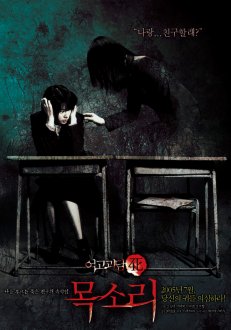 Can you tell our readers how the WC series came about?
Can you tell our readers how the WC series came about?
Lee Choon-yun: Let's see, it began with Mr. Oh Ki-min...
Now the head of Masulpiri (literally "Magic Flute") Productions.
Lee: Right, Oh had the screenplay for Whispering Corridors and showed it to various production companies but they all rejected it. Meanwhile, I became aware of a Japanese horror film set in a school [Gakko no kaidan, released in 1995] and thought perhaps this type of idea might work well in Korea. In addition, as you probably know, many Korean schools have these "legends." Scary stories, really. These stories remind you of "Hometown of Legends." [An old Korean TV series that used to dramatize the folklore collected from various localities] I thought maybe we could try a contemporary version of that with the scary stories adapted from school legends. I guess another motivation on my part was... my antagonism toward the way Korean education was going at the time... Korean secondary education was geared toward suppressing individuality and creativity, and turning students into these "good boys and girls," punched from cookie-cutter molds, you know? Finally, I thought that a girl's high school was an attractive setting. It's a space that stimulates male curiosity, a place that men have never been in but are fascinated by. Conversely, for women it's an environment that they can feel nostalgic about. Even if they didn't go to a girl's high school, they can certainly relate to what's going on in there. And as you know, Whispering Corridors, fortunately, turned out to be a big hit. I did not quite think of developing it into a series, until the first film became a great commercial success.
(to Cha Ye-ryun): Have you seen any previous installment of the series, prior to being cast in Voice?
Cha: Yes.
Which one?
Cha: All three of them.
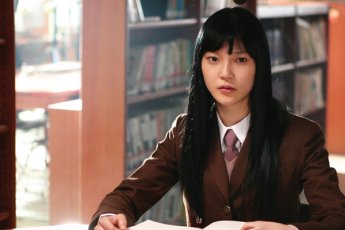 What were your impressions? And how was it like to be cast in the fourth film in the series?
What were your impressions? And how was it like to be cast in the fourth film in the series?
Cha: I loved them. They all had different strengths, with very distinctive identities, I thought. As for being cast in the fourth film, I mean, it was fantastic! The series has a terrific reputation as a showcase for new actresses, so I was really honored to be one of the newly chosen. And the screenplay, the production, Mr. Director [Choe Ik-hwan], everything about Voice was top class and gave me a wonderful chance to prove myself. For me, it was not the role of Cho-ah that was intimidating, it was finding out just how popular and well respected the title "Yeogo Gwedam" was among Koreans. Everybody I know reacted strongly when I told him or her that I was set to star in the latest "Yeogo Gwedam" film. I don't think any other film, even with me playing a much bigger role, would have elicited such strong responses. The responses, of course, have been extremely positive and I think it will help me finding good roles in the future.
(to Producer Lee): The WC series has successfully overcome many problems associated with sequels, has it not? For instance, there are no continuing characters from one film to the next. You didn't allow for an embarrassing situation like a high school student in one film returning as a teacher in the next installment, for instance...
Lee: That's right. From the very beginning I wanted "Yeogo Gwedam," or Whispering Corridors in English, to be a brand name.
So it was your initial plan to have different directors and actors for each movie...
Lee: Absolutely. Different directors, different stories, different settings, different schools. Different types of schools, if possible. We tried very hard to avoid repeating the same thing again.
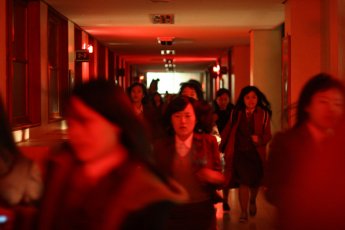 How did you manage to resist the argument that the successful elements from the first film should have been retained in the sequels, which is unfortunately the standard way in which film producers approach a viable franchise?
How did you manage to resist the argument that the successful elements from the first film should have been retained in the sequels, which is unfortunately the standard way in which film producers approach a viable franchise?
Lee: Well, since I was determined to hire a new director for each installment, I decided not to bother him or her about where the film should go. And what do we really mean by "success?" Among four films in the WC series, two of them made money, and the other two won a lot of praise. I probably will not be happy if I can't have either, but I certainly don't expect to have both all the time. In other words, selling a lot of tickets is not the only criterion of "success." Going back to what I was saying, there was no way the series could have been successful if we allowed the movies to take after one another. Their distinctive identities are an important part of their appeal to moviegoers. And it's not an easy job, I tell you, to keep each WC film so different from the one before.
(to Actress Cha): Were the roles decided already when you auditioned for Voice?
Cha: No, not at all.
Who decided you should play Cho-ah?
Cha: Mr. Lee (Laughter). Really, Mr. Director, Mr. Lee and others spent a lot of time trying us out in different roles. They auditioned 4,500 actresses and narrowed down the pool to thirteen...
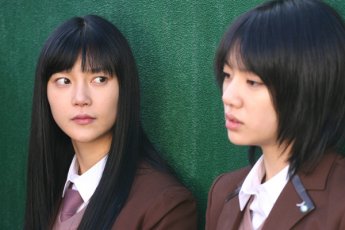 Whoa (Laughter).
Whoa (Laughter).
Cha: ...and eventually to three of us, and they still couldn't make up their minds about what roles we should play! Finally Mr. Lee made the final decision, "You should play Cho-ah, you should play Young-eon," like that. (Laughter)
When I saw Voice in the theater, the audience stayed all the way through the end credit scroll, trying to figure out what Cho-ah was saying (Laughter). The dialogue was spoken silent, but were there specific lines prepared in the screenplay for that scene?
Cha: Actually no. I ad-libbed Cho-ah's monologue. I discussed it with Mr. Director, of course, but he gave me nearly total freedom to come up with appropriate lines. I worked on it for about two months. I must admit I was under some pressure, because I knew that this was the last shot of the movie the audience members would see, as they prepare to leave the theater.
I made out you saying, "I will never forgive you." (Laughter)
Cha: That's great. I was focusing emotionally on Cho-ah's anger and resentment, riffing on the theme of "What did I do to deserve this?" And there was quite a bit about "I, too, will find someone who loves me and will regain my voice," and then of course going after [the culprit's name removed to prevent a spoiler] to avenge her death.
I thought it was interesting that Cho-ah, who understands the situation better than any other character, is actually robbed of her voice at the end.
Cha: Right.
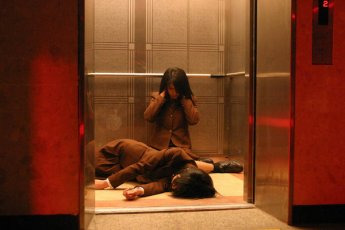 (To Producer Lee): Are there guidelines you set up for choosing filmmakers for the series?
(To Producer Lee): Are there guidelines you set up for choosing filmmakers for the series?
Lee: Well, as you know, there are many talented young filmmakers in Korea, some of whom have already made highly professional and polished short films. I do get a lot of unsolicited treatments and screenplays from young guys and gals, wanting to direct the next installment of the WC series. Even internet users send me tons of stuff.
What I was thinking about is more like, what kind of filmmakers were deemed appropriate for the series? Some really talented filmmakers nonetheless might want to push the series in a direction you might not find appropriate...
Lee: Oh, that. Yes, I want WC films to be strong horror films, but "pretty" films too. Beauty is an important factor. Excessive cruelty and gore are definitely not good.
Cha: Mr. Lee hates the sight of blood. (Laughter)
Lee: I do, really. Also, high school students getting pregnant and aborting fetuses in bathroom stalls, stuff like that, this might be quite horrific for some, but it's not really what this series is all about, you know. I don't think WC films should be made from the viewpoint of adults, by which I mean middle-aged men. That is just another way of exploiting children for the sake of adult pleasure.
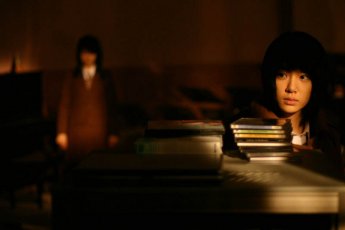 Japanese films sometimes show a tendency to indulge in adult fantasies about teenage behavior...
Japanese films sometimes show a tendency to indulge in adult fantasies about teenage behavior...
Lee: Yup, high school girls all sexed up, boys packing guns into classrooms, behaving like real gangsters and killing each other, and so on. I understand that this is a matter of stylistic choice in a way, and perhaps an effect of living in a more sexually open culture, with pornography as a cinematic genre much better developed than in Korea, but that is not what my movies are about. Of course, the WC series are horror movies so not everything is picking daisies in a flower garden, you know. (Laughter) They are supposed to be scary. That's fine, but I do want to keep making movies whose primary audience remain high school girls or young women who just stepped out of that all-girls environment. It is important that there are Korean movies that can be appreciated by them, and give these people a voice, so to speak.
Cha: I do find WC films far more realistic than so-called "realistic" movies about high school life. The cast members did contribute to making characters realistic by drawing upon their own experiences. We shared our life stories with each other, mostly related to schooling, in the "summer camp" organized by the production team prior to crank-in, and ended up finding a lot of common ground among ourselves.
(to Actress Cha): Can you tell us about your next film, One Miserable Day [slated to be released in spring 2006]?
Cha: It's almost ready to come out! I am very excited. It was strange to suddenly work in such a totally different environment... from all girls everywhere you go, to being surrounded by these older men... seven men to just one girl, that's me (Laughter). And boy, was it intimidating to work with such senior members of the acting profession, all great actors! But they treated me like a princess. So I had great fun.
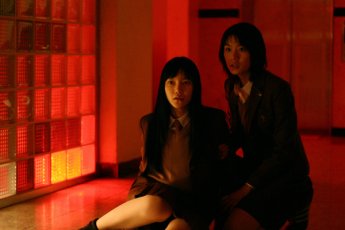 (to Producer Lee): Any special messages to non-Korean viewers of the Whispering Corridors series?
(to Producer Lee): Any special messages to non-Korean viewers of the Whispering Corridors series?
Lee: Hmm... well I guess I am curious about the... school uniform, how it's going to be perceived by viewers in countries like the US. I believe the school uniform is one of the absolutely essential components of this series. It's not really meant to suggest repression, though, so I hope the non-Korean viewers don't take it that way. I think the WC movies are probably easier to understand by people living in countries where school uniforms are still the norm. Another thing is this peculiar combination of discipline and the really crazy competition among students that dominate education in Korea. I suppose the competition itself is easy enough to understand on an abstract level, but I want non-Koreans to understand that competition in real life can sometimes be very stifling. If everyone competes for the same goals, the same goods, then it becomes stifling.
What are your plans for future installments?
Lee: Oh, the new one will... come out this summer.
Really?! I will be in Korea this summer!
Lee: Well, I think it will be ready by then.
Wow! (Laughter) Thank you so much for sharing your views today.
Lee & Cha: You're welcome.
* Kyu Hyun Kim would like to extend special thanks to Professor Cheol Ho at San Francisco State University and KIMA members Danny Hyunmin Lee and Hyemin Kwak for making this interview possible.
Kyu Hyun Kim, SAN FRANCISCO February 9, 2006